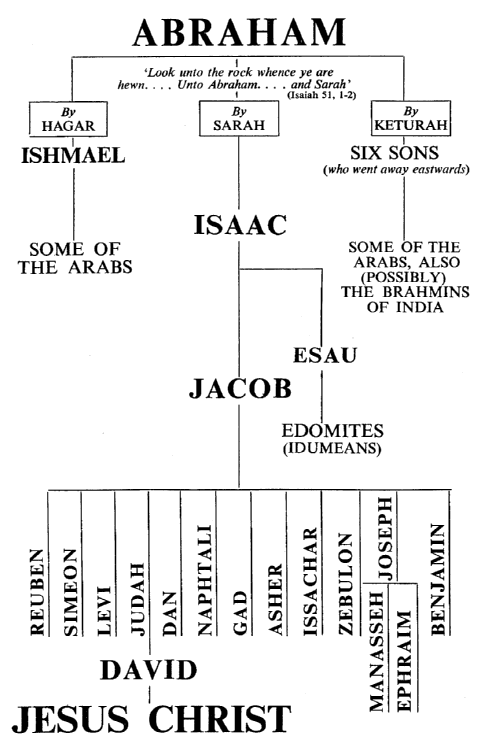Against the teachings of the prevailing cultural Marxist gospel in mainstream churches stands solid, biblical covenant theology. That God deals with His creation through covenants is explicitly clear from Scripture. The fact that the Hebrew word for covenant, berith (ברית), is used 135 times in the Old Testament is testimony of this. The Old Testament’s view of God’s relationship to mankind and mankind’s relationship with each other is very far removed from the individualistic worldview of the average Westerner in society today. In the Old Testament in particular, it is very clear that God does not deal with mankind as a loosely disordered aggregation of individuals. No, from the very first page of Scripture, this secular ideology is refuted through and through.
From the beginning, God purposed to establish His covenant for the splendor of His glory. Herman Witsius once said, “In studying divine covenants in general, one is treading through understanding God’s Redemptive Plan throughout history.” The origin of this covenantal order in God’s relationship to creation is in what is commonly called the covenant of redemption. Matthew Henry writes of this covenant within the Trinity in his commentary on Psalm 110:
Glorious things are here spoken of Christ, and such as oblige us to consider how great he is. . . . [H]e is constituted a sovereign Lord by the counsel and decree of God himself: The Lord, Jehovah, said unto him, Sit as a king. He receives of the Father this honour and glory (2 Pet. i. 17), from him who is the fountain of honour and power, and takes it not to himself. He is therefore rightful Lord, and his title is incontestable; for what God has said cannot be gainsaid. He is therefore everlasting Lord; for what God has said shall not be unsaid. He will certainly take and keep possession of that kingdom which the Father has committed to him, and none can hinder.1.
This covenant is the eternal agreement in which the Father appointed the Son, through the power of the Spirit, as the Redeemer of His elect people.2 Here we also see that even salvation is not conducted individualistically and in isolation, but strictly covenantally and by God’s sovereign grace. Throughout the salvation-history revealed in Scripture, covenants play a central role, culminating in the fullness of time. Out of this first covenant within the Godhead comes the various covenants that God, from His own initiative, established with mankind. Among these are the covenant of works, established with Adam before the fall, but succeeded by the covenant of grace after the fall (Gen. 3:15). This covenant of grace, built on the promise of the coming of the redeeming Messiah, forms the basis for the Noahic, Abrahamic, Mosaic, and Davidic Covenants. This covenantal means of redemption by God is also the reason why Christ commands the disciples to go evangelize and baptize the nations (ethnos), rather than mere individuals, in Matthew 28:19. This covenantal-redemption paradigm along genealogical lines also continues into and beyond the New Testament period in the Christian church (Acts 2:38-39; 16:14-15, 31-34). It is for this exact reason that, so often in Scripture, the relationship between parents and their children, as well as the necessity of Christian education in this context, is so important. The relationship between a parent and his child is, after all, to be a type of the Father and His adopted children in Christ.
Lineage is thus a cardinal component in God’s continuation of His covenant with mankind. This is clearly seen in the large number of genealogies in the Bible. Not only does the New Testament start with a genealogy, but the table of nations (Gen. 10) and the first eleven chapters of the book of Chronicles are very important genealogies as well. Even though they are not ideal texts to read at family Bible study, they still play a cardinal role in proving the historicity of the Bible, pointing to Christ as the centre of God’s redemptive plan in creation, and showing how God, through His sovereign providence, cares for creation in general and His elect people in particular.
Furthermore, God also pours out His covenantal punishment and blessings along genealogical lines (Ex. 20:5). Man is born a sinner and dead in sin (Rom. 3). The reason for this is that, through Adam, sin has entered the world, and all men as his descendents are born depraved because of his sin, as if we committed it ourselves (Rom. 5). The Belgic Confession summarizes this doctrine of original sin in article 15: “It is a corruption of nature – an inherited depravity that even effects small infants in their mother’s womb, and the root which produces in man every sort of sin.”3 However, all men are not equally depraved, and we undoubtedly feel the effect of how godly or ungodly a life our forefathers lived. It is therefore a great privilege and honor to be born into a Christian family, but even a greater honor to be born into a family that has been Christian through multiple generations. Sins of parents and even previous generations often have a very negative effect on later generations. A practical example of this would be when a pregnant woman experiments with drugs, and her children are born addicted to these unhealthy drugs, or when a man hits his wife, and his son grows up to do the same. Liberals might argue heavily against this as exemplifying the effects of the depravity caused by original sin, because they can easily be explained by psychology — but, one must remember that even the science of psychology is part of God’s created order from the beginning, and only studied and learned by man throughout history. Psychological phenomena thus serve the doctrine of original sin and are not, as liberals would argue, a modern intellectual way of explaining the primitive, uninformed worldview of the writers of Scripture. To explain this in simple terms: Scripture teaches that God “is a jealous God, visiting the iniquity of the fathers upon the children” (Ex. 20:5, NKJV). Agnostic psychologists would say that Scripture is wrong, and that children are just naturally inclined to follow their parents’ example. Now, this is true, but I would answer that God decreed that children would follow their parents’ sinful example, rather than a much better example of the neighbors’ parents, in order to visit the iniquity of the fathers upon the children. By this created order, God upholds His purposes of blessing or cursing along genealogical lines. Furthermore, it must be added that children follow their parents’ example not only because they grow up in their homes, but also because they are genetically more inclined to think and react to the world as their biological parents do. This is proven by the fact that adopted children very often cause major problems for their new families that the genetic children do not.
When speaking to His covenant people in the Old Testament, God repeatedly refers to His covenant people as the children of Israel, and He grounds the curse upon the Edomites in their being the genetic offspring of Esau (Mal. 1:2-3). The patriarchs are commanded to circumcise their children as a seal and sign of God’s covenantal love. (For this reason, many Reformed churches still baptize infants today, as the sacrament of baptism is called “the circumcision of Christ” by Paul in Col. 2:11-12.) Because of this covenantal-grace-through-lineage paradigm, believing parents can have the assurance that the salvation of children who died either before or shortly after birth is in the hands of the Almighty Father. If the parents serve God in Spirit and in truth, they can continue life with the blessed assurance that the gift of redemption they received by grace will also be poured out on their children, and that they too will experience life everlasting. The promise of the Messiah coming out of Abraham’s and David’s seed, not coming into the world as a random human being with no ethnic and genealogical identity, is also very important in emphasizing this covenantal paradigm.
The covenantal relationship of Christ towards His elect through genealogical lines is also clearly seen in the post-New Testament period throughout church history. There are many examples of this, of which I will list a few. The great Reformer John Calvin argued in his Institutes that God often elects nations and peoples, just as He does individuals, for His purposes.4 God preserved the Greek text of the New Testament through generations of Byzantines. The Waldensians, residing in Northern Italy, played a cardinal role in preserving the true faith through many generations in the years preceding the Reformation. After being heavily persecuted by the Roman Catholic Church during the Reformation in the 16th century, God has continued to work through genealogical lines with the Germanic and Anglo-Saxon peoples of Northern Europe as His instruments, especially the German and Dutch Protestants, French Huguenots, Scottish and Irish Presbyterians, and English Puritans. Out of these people, many US states and Boer republics of Southern Africa were founded.
The fact that lineage has, throughout history, played such a central role in God’s covenant, and will continue to do so until the Second Coming, is something that man in his natural sinful state tends to hate. But when we see the glory that this paradigm gives to God and the role it plays for His divine ends, we will embrace it and thank God for letting us be a part of it: all by His grace.

Footnotes
| Tweet |
|
|
|





